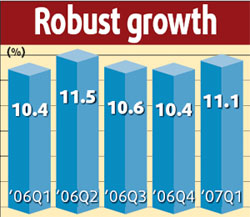Chinese shares closed 2.69 percent higher on Monday after the government imposed restrictions last Friday on the sale of state-owned shares, allaying fears that large stock sales may hurt the stability of the market.
The benchmark Shanghai Composite Index, which covers A and B shares listed on the Shanghai Stock Exchange, rose 2.69 percent, or 101.87 points, to close at 3,883.22 points.
The component index of the smaller Shenzhen Stock Exchange was up 451.06 points or 3.64 percent, to 12,846.41 points.
The combined turnover of the two bourses rose to 159.7 billion yuan (US$ 20.7 billion) from 145.7 billion yuan on the previous trading day, indicating the market continued to regain public confidence following the 5.25 percent drop on July 5.
China's central bank vice governor Wu Xiaoling said at the weekend that the country's monetary policy was not directly targeting the stock market or the real estate sector, which was also believed by analysts to have helped stabilize the market sentiment.
Only 50 stocks declined in value, while 50 stocks went up by the maximum ten percent, except for stocks under "special treatment" in companies that have failed to report profits for two consecutive years.
Heavyweight bank stocks recorded the highest rise, with the Industrial and Commercial Bank of China up 2.13 percent to close at 5.27 yuan, and the Bank of China up 1.6 percent to 5.07 yuan.
China Merchants Bank surged 6.68 percent, while both Shenzhen Development Bank and Fujian-based Industrial Bank gained four percent.
Stocks in the real estate, metallurgical and pharmaceutical sectors also performed well.
The Hushen 300 Index, which tracks 300 companies on the Shanghai and Shenzhen stock exchanges, closed at 3,821.30 points, up 111.02 points, or 2.9 percent.
(Xinhua News Agency July 9 2007)

